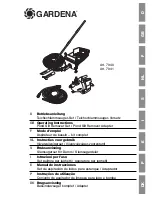
CELL MAINTENANCE
Self cleaning models generally require little or no maintenance. We do however
recommend that periodic inspections are made to ensure debris is not obstruct-
ing the cell. If a calcium deposit appears to be forming on the electrodes, contact
Aquapower-plus or your local dealer for advice.
Note: If debris is collecting at the cell, it indicates a filtration problem that
should immediately be repaired. (Water is bypassing the filtration medium)
If calcium deposits have formed on the cell electrodes, the reason for this may be
one of the following:
•
The cell life is spent and is on the way out. (Replace cell)
•
The salt level is too high
•
Water quality is very poor with an extremely high mineral content.
Contact Aquapower-Plus.
•
Poor water flow through cell
12
To
remove mineral deposits from cell
(if required):
•
Turn unit to off position or switch off power, close all relevant valves and
remove cables from cell
•
Loosen the nuts at either end of the cell and remove cell
•
In a plastic bucket, mix 10 parts water with 1 part Hydrochloric (or Muriatic)
Acid (Caution - wear safety glasses and suitable gloves. Avoid spills on
decks and cement)
•
Place entire cell in this solution. Deposits should dissolve within 15 minutes.
•
Rinse cell and cell terminals with plenty of fresh water.
•
Reinstall cell, connect terminals, open valves and switch on power. Turn unit
back to auto or on position.
SAFETY
Your AquaPower-Plus chlorinator must be installed in accordance with the
installation instructions listed in this manual.
The cell, apart from producing chlorine, produces a mixture of gases, primarily
hydrogen. Hydrogen is not readily dissolved into the water and under normal
filtration conditions it passes through and out the pool returns, harmlessly
dissipating into the atmosphere.
If however the water flow is restricted (blocked skimmer box, incorrectly closed
valve, etc.) and these gases collect in the system, a potentially explosive mixture
could result under certain conditions.
Your Aquapower-plus chlorinator has eliminated this potential hazard with built-in
electronic and physical safety features.
WHEN INSTALLED CORRECTLY THE CHLORINATOR WILL:
1. Switch itself off if the cell is not completely full of water. The sensor posi-
tioned at the top of the cell will detect the absence of water and switch power
to the cell off. It indicates this condition by way of a scrolling message on the
display.
LO FLO - OFF
When the condition improves, a delay will follow and the scrolling message
will cease. The chlorine output will reappear on the display.
2. As a result of the cell’s physical design, contain the gases produced in a non
hazardous volume. This being in the unlikely event that the electronic
protection device fails. (See installation instructions)
17


































